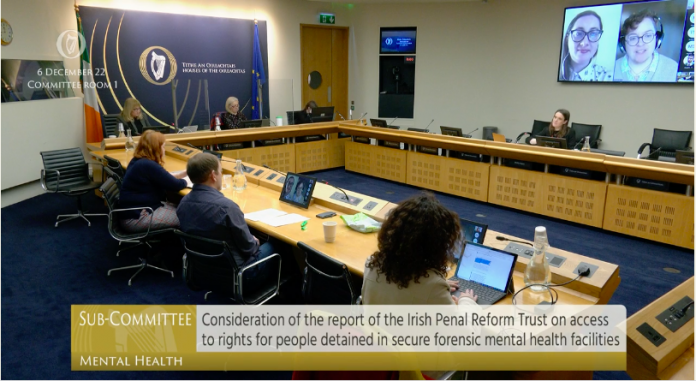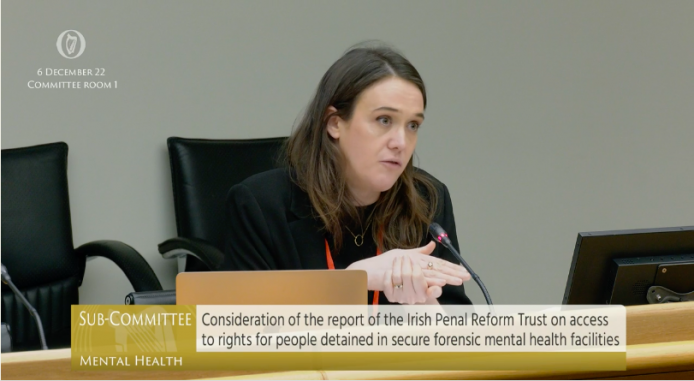Oireachtas Sub-Committee on Mental Health to discuss report on Forensic Mental Health
6th December 2022

IPRT presented at the Oireachtas Sub-Committee on Mental Health to discuss our recently published report on 'Access to Rights for People Detained in Secure Forensic Mental Health Facilities in Ireland' on Tuesday 6 December 2022 in a committee room at Leinster House. IPRT's Legal and Public Affairs Manager and Deputy Director, Molly Joyce, presented an overview of our report and answered questions from politicians at the committee meeting. Researchers Professor Eilionóir Flynn and Eilís Ní Chaoimh supported the discussion.
Opening Statement
Thank you for the invitation and opportunity to meet with the Sub-Committee today to discuss IPRT’s recently published report on Access to Rights for People Detained in Secure Forensic Mental Health Facilities in Ireland. We are delighted that two of the report authors, Professor Eilionóir Flynn and Eilís Ní Chaoimh, are also available to participate in today’s meeting. We will do our best to respond to any questions that you may have following our brief opening remarks.
By way of background, the Irish Penal Reform Trust (IPRT) is Ireland’s leading non-governmental organisation campaigning for rights in the penal system and the progressive reform of Irish penal policy. Our core message is that a penal system that protects and promotes human rights, equality and social justice, and relies upon prison only as a measure of last resort, will contribute to safer communities for everyone.
Background to the Report
In 2021, IPRT commissioned the University of Galway’s Centre for Disability Law and Policy to carry out a scoping study to examine whether people currently detained in forensic mental health facilities in Ireland, namely the Central Mental Hospital (CMH), can access their rights. The research was funded by the Irish Human Rights and Equality Commission (IHREC) and the report builds on the gaps identified in our 2020 Making Rights Real for People with Disabilities in Prison report.
It is important to note at the outset that this research was limited in scope: it involved a literature review mapping relevant Irish laws and policies as well as small-scale qualitative research involving interviews with key stakeholders within the forensic mental health system. Such stakeholders included: staff at the National Forensic Mental Health Service; advocates working in the area of disability rights; a lawyer; and two organisations working in this area. Regrettably, the limited scope of the project meant that interviews with individuals detained in the CMH was not possible.
The report ultimately aims to provide an overview of the issues arising around access to rights for people detained in the CMH as well as an analysis of Ireland’s rights obligations under the UN Convention on the Rights of Persons with Disabilities (CRPD) and other human rights instruments.
Key Findings
What clearly emerges from the report is that people with psychosocial disabilities who are currently detained in the CMH are not afforded their rights as enshrined in the CRPD and international human rights law. Examples of such rights breaches include:
- Issues around the process by which a person may come to be detained in the CMH. Concerns were particularly raised as to the legal bases upon which people are detained, with the lawyer interviewed questioning whether there is any regular oversight of this. The report also notes concerns in respect of several of the pathways by which a person may come to be detained in the CMH. For example, it points out that there is no limit on the length of time an individual can be detained under a finding of “unfitness to plead”, with one staff member referring to a person in the CMH who appears to have been unfit to plead since the 1970s.
- Breach of rights once detained within the CMH. Examples of concerns identified by the report included: the fact that physical side effects of medications are not always fully explained to patients; the presence of a particularly paternalistic culture within the CMH as compared to community-based services; and the ongoing use of seclusion and restraint within the CMH, with that hospital using such tools at a higher rate than other approved centres and failing to use alternatives where possible. The report argues that the latter in particular breaches Articles 15, 16 and 17 of CRPD which pertain to freedom from torture, freedom from violence and abuse and the protection of the integrity of the person.
- Rights concerns in respect of review of detention and discharge. Criticisms of the current structure for review and discharge from the CMH included: the fact that there are no lay members or people with lived experience sitting on the Mental Health (Criminal Law) Review Board; the minimum length of time (six months) required between reviews; decision-making that is arguably paternalistic and/or overly concerned with “risk”; the process by which a person may be returned to the CMH following a conditional discharge, which is decided by one individual – the CMH Clinical Director; and the limited availability of placements and support within the community to which people can move on.
Throughout the report, the overarching point is made that the UN Committee on the Rights of Persons with Disabilities is clear that disability-specific forms of deprivation of liberty contravene the Convention. Furthermore, while in Ireland we often characterise our processes for referral to the CMH as a means of vindicating the rights of persons with disabilities, according to the Committee’s interpretation of the Convention, these processes in fact amount to a violation of rights under CRPD. The report accordingly recommends – as Ireland’s ultimate objective – the abolition of the current forensic mental health system. We in IPRT recognise that this is challenging, and we are realistic that abolition of the current system is not going to happen overnight. The report therefore makes 17 more short-term recommendations that we hope would better align Ireland’s current system with the CRPD and bring us closer to a system that is ultimately CRPD-compliant.
Key Recommendations
These 17 recommendations are set out at pages 62-67 of the report and include practical measures such as:
- increasing transparency by requiring the CMH to publish annual statistics on the legal basis for detention of all patients (Rec 1);
- starting to offer mental health treatment outside the CMH for those unfit to plead and/or found ‘not guilty by reason of insanity’ (Rec 2);
- providing meaningful support to enable people to participate in the trial process rather than being deemed unfit to plead (Rec 3);
- ensuring access to independent advocacy within the CMH (Rec 5);
- mandating that all reported uses of seclusion and restraint include information on the alternatives attempted prior to the use of these practices (Rec 9);
- including people with lived experience on the Mental Health (Criminal Law) Review Board (Rec 13); and
- reviewing ongoing detention of individuals on a more frequent basis (Rec 15).
It is hoped that these suggested reforms – alongside the other recommendations in the report – will help work towards the overarching goal of ending involuntary treatment and abolishing Ireland’s separate tracks of detention for all people with disabilities, including those labelled with a mental disorder. It is also hoped that the report’s recommendations may lessen the harms caused to people currently detained in our forensic mental health system.
Concluding Remarks
Notably, this report was finalised before publication of the Final Report of the High Level Task Force to consider the mental health and addiction challenges of those who come into contact with the Criminal Justice Sector and before the opening of the new CMH in Portrane earlier this month.
IPRT welcomes both the High Level Task Force and the opening of the new CMH as progressive steps that will help address some of the current problems we see. In regards the Task Force, we particularly welcome the various recommendations made to better divert people from the criminal justice system wherever possible. However, we are disappointed that the proposed measures were not costed. The opening of the new CMH in turn has addressed some of the concerns raised in this report around the physical infrastructure of the old building. In particular, we welcome the fact that certain design features of the new CMH will address issues around patients’ open access to the bathroom at nighttime and affords them privacy (which was a specific matter raised by interviewees for this report).
It is clear, however, that both reforms will need to be met with adequate resourcing to ensure the actions of the Task Force report can be implemented and good practice can be maintained in the new CMH. It is also clear that – while welcome – these steps will not be enough on their own to address many of the issues identified in this report and will not in themselves create the broader cultural shift towards CRPD recognition that is needed.

To view the recording of the presentation to the Oireachtas Sub-Committee on Mental Health including the Q&A, see here.
IPRT's full report on 'Access to Rights for People Detained in Secure Forensic Mental Health Facilities in Ireland' is available here.
To view the recording of the report launch event, see our Youtube here.
Related items:
- IPRT Statement on publication of Five Deaths in Custody Reports
- RTÉ Investigates: The Psychiatric Care Scandal
- Worsening safety situation' in Cork Prison sparks call for action (EchoLive.ie)
- Ireland's Prison system is completely 'inhumane' claims Irish Penal Reform Trust (theLiberal.ie)
- Coverage of Progress in the Penal System (PIPS) 2024 Launch by national broadcaster (RTE Six One News)




